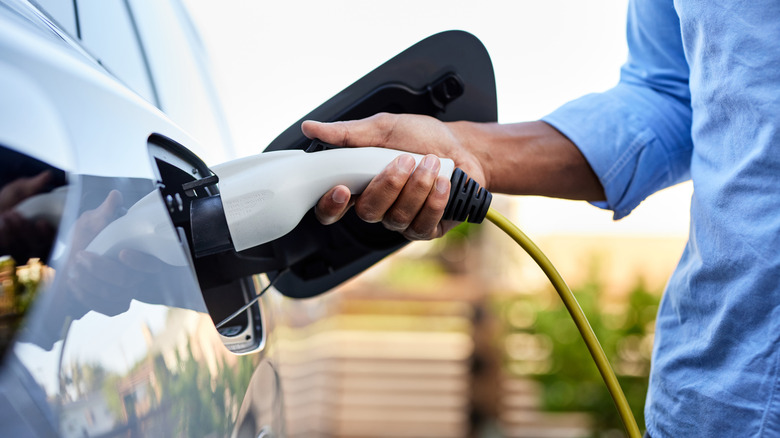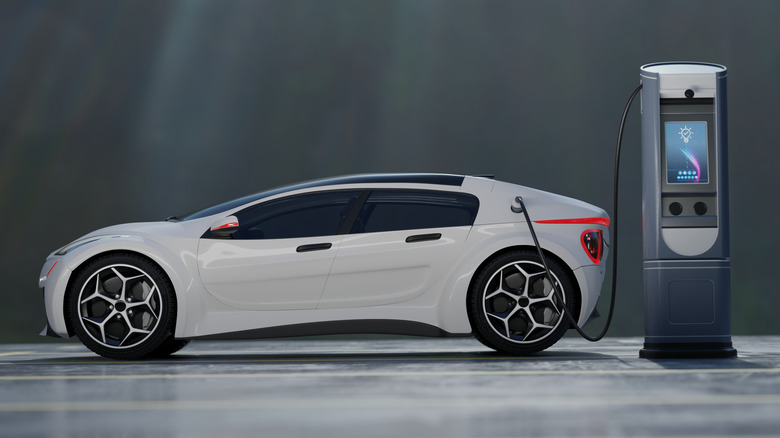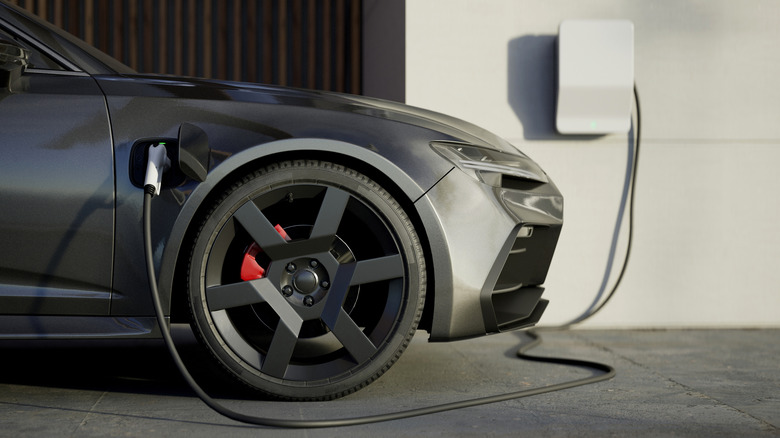How Much Will You Pay To Install An EV Charger At Your Home?
Widespread adoption of electric vehicles is a key front in combating humanity's current reliance on fossil fuels, and the next decade could see a huge bump in EV ownership along with solar panels. This surge in ownership needs to be met with additional EV charger infrastructure, as the current landscape is plagued by unreliable equipment and prices, especially for those who live in more rural areas. Installing your own charging tech at home might just be the best solution if you want to buy an electric car.
The U.S. Department of Energy offers some estimates on how much it would cost to install an EV charger at home, and it's not as crazy as you might think. Residential chargers typically use low-power alternating current (AC) for a full vehicle charge in about eight hours, with the associated equipment running upwards of $900 and installation costs between $400 and $600. Of course, this pricing can vary based on your needs and the type of EV charger you have installed, and there are government tax incentives available to justify the amount you pay.
Cost variance in EV charger installations
There are three levels of electric vehicle chargers that sequentially increase charging speed. The aforementioned "low-power" chargers are considered Level 1, and this tier includes the most basic cable option that you can plug into standard wall sockets. You may not need to pay any equipment costs for a new home station if a plug charger comes with your EV, though a Level 2 charger with mid-to-high power (around 200 to 240 volts AC) is recommended for being faster and safer. Level 2 equipment will generally run you $380 to $690, with installation costs around $1,300 per connector.
Meanwhile, Level 3 chargers typically run direct current (DC), meaning this infrastructure is incompatible with many household electrical grids. These kinds of electric vehicle chargers will mostly be seen at public ports.
As with many aspects of vehicle and home costs, labor is a big chunk of what you pay for EV charger installations, so purchasing more infrastructure at once will reduce overall cost. That said, there are smaller costs associated with operation and maintenance for your home electric vehicle ports to keep in mind. For example, some chargers are networked online to share data like frequency of use, so you'll have to maintain a wired or wireless internet connection and use up bandwidth if one is installed. Charging your EV's empty battery from home using typical residential equipment will also cost $6 of electricity on average.
Tax incentives can help pay for your electric car charger
One reason to go through with installing electric vehicle equipment is that EV infrastructure is shown to increase home value, and the U.S. government may monetarily support your endeavor. There is a federal tax credit of up to $1,000 for each qualified piece of electric vehicle charging equipment installed at an individual residence, currently available through 2032. This covers up to 30% of the charging port, essential components, and labor. That means if you buy a Level 2 charger for $700 and installation costs $1,300, you could receive somewhere around $600 in tax credits. Additional incentives will also vary by state, such as a low-income installation rebate through CalWORKS for Californians, whereas some are even available through utility companies like Puget Sound Energy.
The number of public EV chargers doubled since 2020, with hundreds of millions of dollars more being allocated in grants across the country, so there's no better time to consider switching to electric. It may cost more up front to invest in a new vehicle with additional appliances to install in your garage, but having more government-certified EV chargers in U.S. homes means saving millions in long-term energy costs, not to mention a positive environmental impact.


